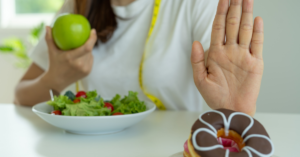Curious if you can maintain your vegan lifestyle while nurturing a healthy pregnancy? Let’s explore the facts together!
As veganism becomes increasingly popular, more women are choosing to embrace this lifestyle—even during pregnancy (1). Vegan diets exclude all animal products and typically emphasize whole foods like vegetables, fruits, grains, and legumes. This eating pattern is linked to various health benefits, including a lower risk of type 2 diabetes and heart disease (2, 3, 4, 5). 🌿❤️
Yet, some people worry that a vegan diet may lead to nutrient deficiencies that could be especially concerning for pregnant women and their babies. So, is it safe to follow a vegan diet while pregnant?
In this article, we’ll explore the current research to determine the safety of a vegan diet during pregnancy and provide practical tips on how to do it properly, ensuring both you and your baby get all the nutrients you need.
What You’ll Learn
- The benefits and potential challenges of a vegan pregnancy
- Essential nutrients to focus on and plant-based sources
- How to plan balanced meals that support a healthy pregnancy
- When to consult a healthcare provider or a dietitian for personalized advice
Quick Takeaway
With careful planning and attention to key nutrients, following a vegan diet during pregnancy can be both safe and rewarding. Let’s explore how you can maintain your vegan lifestyle while supporting your baby’s healthy development! 🥑👶
Thriving on a Vegan Diet During Pregnancy: Safe and Healthy Choices 🌿🤰
Curious if you can maintain your vegan lifestyle while expecting? The answer is a resounding yes—with some careful planning!
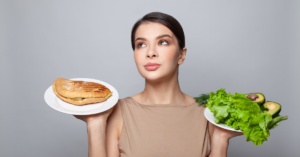
Historically, vegan diets have faced criticism for potentially lacking certain nutrients, especially during sensitive life stages like pregnancy. Concerns often revolve around nutrients such as vitamin B12, omega-3 fatty acids, iron, iodine, calcium, and zinc—all crucial for your health and your baby’s development (6).
A deficiency in these nutrients can lead to complications, including nutrient deficiencies, pregnancy complications, and adverse effects on both maternal and infant health (6). For instance, insufficient vitamin B12 levels during pregnancy may increase the risk of miscarriage, low birth weight, preterm birth, or birth defects (7, 8).
But here’s the good news: a well-planned vegan diet can be just as healthy as a conventional diet that includes meat, eggs, and dairy. Research suggests that women who follow a vegan diet are generally at no greater risk of pregnancy complications than women who don’t. In fact, some studies indicate that vegan women may have a lower risk of postpartum depression, cesarean section (C-section) delivery, and maternal or infant mortality (9, 10).
As a result, several nutrition societies worldwide, including the U.S. Academy of Nutrition and Dietetics, have issued official statements supporting the safety of vegan diets for all stages of life—including pregnancy (11, 12, 13).
The key takeaway? With careful planning, monitoring of nutrient intake, and perhaps the use of fortified foods or supplements, a vegan diet during pregnancy can be both safe and rewarding.
Tips for a Healthy Vegan Pregnancy
- Focus on Nutrient-Rich Foods: Incorporate a variety of fruits, vegetables, whole grains, legumes, nuts, and seeds to cover your nutritional bases.
- Monitor Key Nutrients: Pay special attention to vitamin B12, iron, calcium, omega-3 fatty acids, iodine, and zinc.
- Consider Fortified Foods and Supplements: Talk to your healthcare provider about taking prenatal vitamins or specific nutrient supplements.
- Stay Informed: Regularly consult with a registered dietitian familiar with vegan diets to ensure you’re meeting your nutritional needs.
Reaping the Rewards: How a Vegan Diet Boosts Your Pregnancy Health
Potential Benefits of a Vegan Diet During Pregnancy
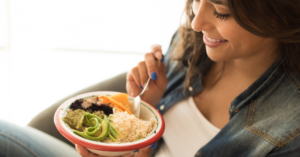
Appropriately planned vegan diets may provide significant health benefits to both you and your baby. Here’s how:
1. Guards Against Gestational Diabetes 🍎
Plant-based diets are rich in fiber and low in sugar and fat. These attributes may safeguard you against gestational diabetes—high blood sugar levels during pregnancy—as well as help prevent excess weight gain (14, 15).
2. Reduces Risk of Preeclampsia 🥦
The high veggie and fiber content in vegan diets may protect against preeclampsia, a complication caused by increased blood pressure during pregnancy (16, 17).
3. Prevents DNA Damage 🥑
Vegan diets may even help prevent DNA damage and reduce your baby’s risk of certain developmental issues (18).
However, it’s important to remember that these benefits apply only to well-planned vegan diets that provide sufficient amounts of all essential nutrients (19).
Overcoming Common Concerns: Ensuring Nutrient Needs on a Vegan Pregnancy 🧐🌿
Worried about getting all the nutrients you and your baby need while sticking to a vegan diet? Let’s tackle those concerns head-on!

While a balanced vegan diet is perfectly acceptable during pregnancy, an improperly planned one can carry risks. Since vegan diets exclude all animal products, they may be low in certain essential nutrients. Failing to compensate for these nutrients may affect both your and your baby’s health.
Key Nutrients to Watch Out For
1. Vitamin B12 🧠
- Why It’s Important: Vital for nerve function and the production of DNA and red blood cells.
- Risks of Deficiency: Increased risk of miscarriage, gestational diabetes, preterm birth, and birth defects (20, 21, 22, 23).
- Vegan Sources: Fortified plant milks, cereals, nutritional yeast, and supplements.
2. Vitamin D ☀️
- Why It’s Important: Supports bone health and immune function.
- Risks of Deficiency: May increase the risk of preeclampsia, low birth weight, and miscarriage (24, 25, 26, 27, 28).
- Vegan Sources: Sunlight exposure, fortified foods, and vitamin D2 or D3 (vegan) supplements.
3. Iron 💪
- Why It’s Important: Essential for making hemoglobin, which carries oxygen in the blood.
- Risks of Deficiency: Can lead to anemia, increasing the risk of preterm birth and low birth weight (29, 30).
- Vegan Sources: Legumes, tofu, tempeh, quinoa, fortified cereals, and leafy greens. Pair with vitamin C-rich foods to boost absorption.
4. Iodine 🧂
- Why It’s Important: Crucial for thyroid function and your baby’s brain development.
- Risks of Deficiency: May result in poor infant growth and compromised mental function (31, 32).
- Vegan Sources: Iodized salt, seaweed (in moderation), and iodine supplements.
5. Calcium 🦴
- Why It’s Important: Necessary for building strong bones and teeth.
- Risks of Deficiency: Increases the risk of preeclampsia, fractures, and bone disease in mothers (33, 34, 35).
- Vegan Sources: Fortified plant milks and juices, tofu made with calcium sulfate, almonds, sesame seeds, and leafy greens.
6. Omega-3 Fatty Acids 🌊
- Why It’s Important: Important for your baby’s eyes, brain, and nervous system development.
- Risks of Deficiency: Low levels of EPA and DHA may affect your baby’s development (36).
- Vegan Sources: Flaxseeds, chia seeds, hemp seeds, walnuts, and algae-based omega-3 supplements.
7. Protein 🍛
- Why It’s Important: Essential for your baby’s growth and development.
- Risks of Deficiency: May slow your baby’s growth if intake is insufficient (37, 38).
- Vegan Sources: Beans, lentils, tofu, tempeh, seitan, quinoa, and nuts.
8. Zinc 🔬
- Why It’s Important: Supports immune function and cell growth.
- Risks of Deficiency: May result in low birth weight, prolonged labor, and preterm birth. Plant-based zinc is less easily absorbed, so requirements may be higher (39, 40, 41, 42).
- Vegan Sources: Whole grains, legumes, nuts, seeds, and fortified cereals.
9. Choline 🥦
- Why It’s Important: Essential for the development of your baby’s brain and nervous system.
- Risks of Deficiency: Most women get too little during pregnancy, and plant foods contain only small amounts (43, 44).
- Vegan Sources: Soybeans, quinoa, broccoli, Brussels sprouts, and supplements.
Making Sure You and Your Baby Thrive
Getting sufficient amounts of these nutrients on a vegan diet is possible but requires careful planning:
- Consider Supplements: You may need to take vitamin B12, vitamin D, omega-3s (DHA/EPA), iron, iodine, calcium, zinc, and choline supplements.
- Eat Fortified Foods: Opt for foods fortified with essential nutrients, like plant milks and cereals.
- Combine Foods Wisely: Pair iron-rich foods with vitamin C sources to enhance absorption.
- Consult a Professional: A registered dietitian specializing in vegan diets can help tailor a meal plan to meet your nutritional needs.
Remember: Vegan diets are naturally low in certain nutrients, so planning and professional guidance are key. If you plan to follow this diet while pregnant, take supplements as needed and consult a healthcare provider or dietitian to ensure you and your baby stay healthy.
By addressing these common concerns proactively, you can confidently continue your vegan journey throughout pregnancy! 🌺✨
Nourishing You and Your Baby: What to Eat on a Vegan Pregnancy Diet 🍽️🌿
Ready to fill your plate with delicious foods that support both you and your baby’s health? Let’s explore the best choices!
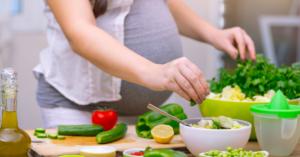
Well-planned vegan diets should combine nutrient-dense foods with fortified options and supplements to ensure you’re meeting all your nutritional needs during pregnancy.
Nutrient-Rich Plant Foods to Include
Incorporate these powerhouse foods into your vegan pregnancy diet:
- Tofu, Seitan, and Tempeh 🥢
- Why? These soy products are rich in protein and can easily replace meat in many recipes.
- Tip: While mock meats are available, enjoy them in moderation due to higher fat and salt content.
- Legumes 🌱
- Why? Beans, peas, and lentils are excellent sources of fiber and plant-based protein.
- Boost Absorption: Sprouting, fermenting, and thorough cooking can make it easier for your body to absorb nutrients (45).
- Nuts and Seeds 🥜
- Why? They’re packed with iron, zinc, and healthy fats.
- Daily Dose: Eat one to two Brazil nuts daily to meet your selenium needs, and include walnuts, hemp seeds, chia seeds, or flaxseeds for essential omega-3 fatty acids (46).
- Calcium-Fortified Plant Milks and Yogurts 🥛
- Why? They help you meet your calcium requirements.
- Choose Wisely: Opt for unsweetened versions to limit added sugars.
- Nutritional Yeast ✨
- Why? This protein-rich topping is often fortified with vitamin B12 and adds a cheesy flavor to dishes.
- Whole Grains and Pseudocereals 🌾
- Fermented or Sprouted Foods 🥖
- Colorful Fruits and Vegetables 🍓🥦
Tips to Boost Your Diet’s Nutrient Content
Enhance your vegan pregnancy diet with these simple steps:
- Include Fortified Foods 🥣
- Action: Choose plant milks and yogurts fortified with calcium, vitamin D, and vitamin B12.
- Benefit: Easily boosts your intake of essential nutrients.
- Mind Your Selenium Intake 🌰
- Action: Eat one Brazil nut daily.
- Benefit: Meets your daily selenium needs (56).
- Optimize Omega-3s 🐟
- Action: Incorporate 2 tablespoons of chia or flaxseeds, 1/4 cup of hemp seeds, or 1/3 cup of walnuts into your meals.
- Benefit: Provides alpha-linolenic acid (ALA), an essential omega-3 fatty acid (57).
- Enhance Nutrient Absorption 🍳
- Pair Foods Wisely 🍊
- Action: Combine iron-rich foods with vitamin C sources like citrus fruits, strawberries, or bell peppers.
- Benefit: Enhances iron absorption.
Personalize Your Plan
- Consult a Dietitian: Consider having a registered dietitian review your diet to ensure you’re meeting all your nutrient needs.
- Stay Hydrated: Drink plenty of water to support overall health and nutrient transport.
- Listen to Your Body: Pay attention to hunger and fullness cues, and adjust portions as needed.
Remember: Eating a diverse range of whole, nutrient-rich foods is key to a healthy vegan pregnancy. With careful planning and these tips, you can nourish both yourself and your baby effectively.
Essential Supplements for a Healthy Vegan Pregnancy 💊🌿
Wondering how to ensure you’re getting all the nutrients you and your baby need on a vegan diet? Let’s explore the key supplements that can make a difference!

Why Supplements Matter
Some nutrients are difficult—or even impossible—to obtain in adequate amounts from whole plant foods alone. Supplementing your diet ensures you and your baby receive all the essential nutrients for a healthy pregnancy.
Top Supplements to Consider
1. Vitamin B12 🧠
- Why It’s Essential: Vital for nerve function and the production of DNA and red blood cells.
- Vegan Challenge: Naturally found in animal products; plant-based sources are limited.
- Solution: While fortified foods can help, a vitamin B12 supplement is the most reliable way to ensure you’re getting enough (64).
2. Vitamin D ☀️
- Why It’s Essential: Supports bone health and immune function.
- Vegan Challenge: Limited sun exposure can lead to deficiencies; dietary sources are few.
- Solution: Consider taking vitamin D2 or lichen-derived vitamin D3 supplements, especially if you get less sun (65, 66).
3. Omega-3 Fatty Acids (EPA and DHA) 🌊
- Why It’s Essential: Crucial for your baby’s brain, eyes, and nervous system development.
- Vegan Challenge: EPA and DHA are primarily found in fish and fish oil.
- Solution: Algae oil supplements are a vegan-friendly source of EPA and DHA (67).
4. Iodine 🧂
- Why It’s Essential: Supports thyroid function and your baby’s brain development.
- Vegan Challenge: Plant foods may not provide enough due to iodine-poor soils.
- Solution: Since iodized salt and seaweed can lead to excessive intake, an iodine supplement is a safer option (68).
5. Choline 🥦
- Why It’s Essential: Important for the development of your baby’s brain and nervous system.
- Vegan Challenge: Plant foods contain only small amounts.
- Solution: A choline supplement helps meet your increased needs during pregnancy (69).
6. Folate (Folic Acid) 🌿
- Why It’s Essential: Critical for preventing neural tube defects and supporting fetal development.
- Vegan Advantage: Plant-based diets are usually rich in folate.
- Solution: Despite dietary intake, all women who are pregnant or trying to conceive should take a folic acid supplement (70).
Additional Supplements to Consider
- Iron: May be necessary if you’re not meeting your needs through diet alone.
- Zinc: Important for immune function and cell growth.
- Calcium: Essential for bone health; supplements can help if dietary intake is insufficient.
Choosing the Right Prenatal Vitamin
While prenatal vitamins are helpful, many lack adequate amounts of choline, omega-3s, and vitamin B12 (71). It’s important to read labels carefully and possibly take additional supplements to fill any gaps.
Consult Your Healthcare Provider
Before starting any new supplements, it’s crucial to talk to your healthcare provider. Excessive intake of certain nutrients can interfere with the absorption of others. Your provider can help tailor a supplement regimen that’s right for you (72, 73, 74).
Bottom Line
If you’re following a vegan diet while pregnant, supplements like choline, algae oil, iodine, and vitamins B12 and D are essential to support your health and your baby’s development. With careful planning and professional guidance, you can confidently nourish both yourself and your baby on a vegan diet.
Delicious and Nutritious: A 7-Day Vegan Meal Plan for Expecting Moms 🥗🌈
Looking for tasty and wholesome meal ideas to support your vegan pregnancy? We’ve got you covered with a week’s worth of nourishing dishes!
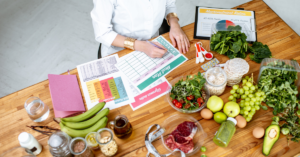
Why Meal Planning Matters
Meal planning ensures you’re getting a diverse range of nutrients essential for you and your baby’s health. This sample meal plan is packed with vitamins, minerals, and plant-based proteins to keep you energized throughout the week.
Your Week of Flavorful Vegan Meals
🌟 Monday
- Breakfast: Chia pudding made with fortified soy milk, topped with fresh berries, chopped nuts, and a sprinkle of cinnamon.
- Lunch: Quinoa salad with roasted bell peppers, black beans, diced avocado, sunflower seeds, and mixed greens drizzled with lemon-basil vinaigrette.
- Dinner: Whole grain penne pasta tossed in a hearty tofu Bolognese sauce, served over a bed of peppery arugula.
🌟 Tuesday
- Breakfast: Creamy spinach and mango smoothie blended with oats and almond butter.
- Lunch: Whole grain pita chips served with trio dips—zesty salsa, black bean hummus, and creamy guacamole—alongside crispy roasted kale chips.
- Dinner: Tempeh stir-fry with rice noodles, bok choy, baby corn, bell peppers, and a tangy vegan teriyaki sauce.
🌟 Wednesday
- Breakfast: Breakfast burrito filled with scrambled tofu, sautéed mushrooms, and dairy-free pesto wrapped in a whole wheat tortilla. Enjoy with a soy milk cappuccino.
- Lunch: Veggie sushi rolls paired with vegan miso soup, refreshing wakame seaweed salad, and steamed edamame sprinkled with sea salt.
- Dinner: Red lentil dahl simmered with spinach, carrots, and broccoli, served over fragrant wild rice.
🌟 Thursday
- Breakfast: Overnight oats soaked in oat milk, topped with sliced bananas, chopped almonds, chia seeds, and a drizzle of maple syrup.
- Lunch: Savory tofu and mushroom quiche with a side of sautéed beet greens and cherry tomatoes.
- Dinner: Baked sweet potatoes loaded with white beans, tangy tomato sauce, sweet corn, diced avocado, and sautéed collard greens.
🌟 Friday
- Breakfast: Creamy coconut yogurt topped with homemade granola, fresh strawberries, a swirl of almond butter, coconut flakes, and ground flaxseeds.
- Lunch: Hearty tofu and udon noodle soup brimming with bok choy, shiitake mushrooms, and carrots.
- Dinner: Black bean and kale chili served over cooked amaranth, garnished with fresh cilantro and lime wedges.
🌟 Saturday
- Breakfast: Fluffy whole grain pancakes topped with peanut butter, sliced peaches, a dollop of coconut yogurt, and a touch of maple syrup.
- Lunch: Spanish-style Tortilla de Patatas made with chickpea flour, golden potatoes, onions, and black beans, served over mixed greens with diced red peppers.
- Dinner: Fully loaded veggie burger on a whole wheat bun with lettuce, tomato, vegan cheese, and avocado, accompanied by a red cabbage and carrot coleslaw.
🌟 Sunday
- Breakfast: Homemade vegan blueberry-rosemary scones served with cashew butter, fresh fruit salad, and a glass of fortified orange juice.
- Lunch: Creamy white bean and pumpkin soup topped with roasted pumpkin seeds, shredded red cabbage, puffed quinoa, and a drizzle of coconut milk.
- Dinner: Layered vegan lasagna with seitan, eggplant, zucchini, and a creamy cashew basil spread, served with a crisp radish and arugula side salad.
Wholesome Vegan Snacks to Keep You Satisfied
- Roasted Chickpeas: Crunchy and protein-packed.
- Plant Yogurt Parfait: Layer with fruit and homemade granola.
- Nutritional Yeast Popcorn: A savory, cheesy-flavored treat.
- Veggies and Hummus: Fresh vegetables dipped in creamy hummus.
- Apple Slices with Almond Butter: A sweet and satisfying combo.
- Trail Mix: Mix nuts, seeds, and dried fruits for on-the-go energy.
- Homemade Energy Balls: Blend dates, oats, and cocoa powder.
- Chia Seed Pudding Cups: Prep with coconut milk and top with berries.
- Whole Grain Muffins: Bake with bananas and walnuts.
- Granola with Plant Milk: A quick and crunchy option.
- Steamed Edamame: Lightly salted for a protein boost.
- Herbal Tea Latte: Enjoy with a splash of soy milk and a piece of fruit.
Tips for Success
- Prep Ahead: Batch-cook grains and beans to save time during the week.
- Diversify Your Plate: Aim for a colorful array of fruits and veggies to maximize nutrient intake.
- Stay Hydrated: Drink plenty of water and include hydrating foods like cucumbers and watermelon.
- Listen to Your Body: Adjust portion sizes based on your hunger and energy needs.
Quick Takeaway
This meal plan offers a variety of delicious and nutritious options to keep your vegan pregnancy diet exciting and fulfilling. Remember, balance and diversity are key to meeting your nutritional needs.
A 7-Day Vegan Meal Plan for Pregnant Women in India 🥘
Your Week of Nutritious and Flavorful Meals
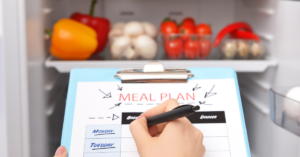
🌟 Monday
- Breakfast: Moong Dal Cheela (savory lentil pancakes) stuffed with spinach and served with mint chutney.
- Mid-Morning Snack: A handful of almonds and raisins.
- Lunch: Red rice with Rajma Masala (kidney bean curry) and a side of cucumber raita made with coconut yogurt.
- Evening Snack: Fresh fruit salad with seasonal fruits like mango, papaya, and pomegranate.
- Dinner: Bajra Rotis (pearl millet flatbread) with Baingan Bharta (roasted eggplant mash) and a side of mixed vegetable sabzi.
🌟 Tuesday
- Breakfast: Ragi Porridge cooked in almond milk, sweetened with jaggery, and topped with chopped bananas and walnuts.
- Mid-Morning Snack: Coconut water and a small bowl of sprouted moong salad.
- Lunch: Brown rice pulao with mixed veggies, served with Chana Dal (split chickpea curry) and beetroot thoran (stir-fry).
- Evening Snack: Roasted makhana (fox nuts) spiced with turmeric and black pepper.
- Dinner: Masoor Dal Soup (red lentil soup) with whole wheat chapatis and a side of stir-fried okra.
🌟 Wednesday
- Breakfast: Vegetable Upma made with semolina, carrots, peas, and cashews, served with a side of tomato chutney.
- Mid-Morning Snack: A glass of fortified soy milk smoothie with berries and flaxseeds.
- Lunch: Quinoa khichdi with lentils and vegetables, accompanied by cabbage poriyal (coconut-infused stir-fry).
- Evening Snack: Steamed corn on the cob sprinkled with lime juice and chili powder.
- Dinner: Tofu Tikka Masala with jeera rice (cumin rice) and a side of kachumber salad (cucumber, tomato, onion).
🌟 Thursday
- Breakfast: Idli made with fermented rice and lentil batter, served with sambar (lentil stew) and coconut chutney.
- Mid-Morning Snack: Dates stuffed with almond butter.
- Lunch: Whole wheat parathas stuffed with spiced mashed potatoes (aloo paratha), served with curd made from cashew milk and mint chutney.
- Evening Snack: Sliced guava with a pinch of chaat masala.
- Dinner: Palak Tofu (spinach and tofu curry) with millet rotis and a side of carrot and cucumber raita.
🌟 Friday
- Breakfast: Oats and chia seed porridge topped with sliced apples, cinnamon, and a drizzle of honey (or maple syrup for strict vegans).
- Mid-Morning Snack: Papaya slices with a squeeze of lime.
- Lunch: Lobia Curry (black-eyed pea curry) with brown rice and pumpkin sabzi.
- Evening Snack: Vegetable cutlets made from beetroot and sweet potatoes, served with green chutney.
- Dinner: Vegetable Biryani made with basmati rice, assorted vegetables, and aromatic spices, served with soy yogurt raita.
🌟 Saturday
- Breakfast: Besan Ka Cheela (chickpea flour pancakes) with chopped onions, tomatoes, and coriander, served with tamarind chutney.
- Mid-Morning Snack: Fresh coconut slices.
- Lunch: Methi Thepla (fenugreek flatbread) with aloo gobi (potato and cauliflower curry) and a side of lemon pickle.
- Evening Snack: Banana and date smoothie with almond milk.
- Dinner: Chickpea and spinach curry with quinoa and a side of roasted eggplant salad.
🌟 Sunday
- Breakfast: Vegan masala dosa stuffed with spiced potato filling, served with sambar and tomato chutney.
- Mid-Morning Snack: Amla juice (Indian gooseberry) mixed with honey (or agave syrup).
- Lunch: Dal Makhani (made with black lentils and red kidney beans using coconut cream) with whole grain naan and mixed vegetable salad.
- Evening Snack: Peanut chikki (jaggery and peanut brittle) and herbal tea.
- Dinner: Stuffed bell peppers with a filling of spiced quinoa and veggies, served with a side of stir-fried greens.
Wholesome Indian Vegan Snacks to Enjoy
- Roasted chana (chickpeas) spiced with cumin and coriander.
- Khaman dhokla made from fermented gram flour.
- Fruit chaat with a mix of seasonal fruits, sprinkled with chaat masala.
- Masala puffed rice (bhel) with onions, tomatoes, and tamarind chutney.
- Sweet potato fries baked and seasoned with herbs.
- Homemade sesame seed and jaggery ladoos.
- Turmeric ginger tea with a dash of lemon.
Nutrient-Rich Traditional Foods for Pregnancy
- Ragi (Finger Millet): High in calcium and iron, supports bone health.
- Bajra (Pearl Millet): Rich in fiber and essential amino acids.
- Makhana (Fox Nuts): Good source of protein and magnesium.
- Coconut: Provides healthy fats and electrolytes.
- Lentils and Legumes: Excellent sources of protein and iron.
- Green Leafy Vegetables: Spinach, fenugreek, and drumstick leaves for iron and folate.
- Nuts and Seeds: Almonds, walnuts, flaxseeds, and chia seeds for omega-3 fatty acids.
Tips for a Healthy Vegan Pregnancy Diet in India
- Fortified Foods: Include fortified plant-based milks and cereals to boost intake of vitamins B12 and D.
- Vitamin C-Rich Foods: Consume citrus fruits, tomatoes, and bell peppers to enhance iron absorption from plant sources.
- Stay Hydrated: Drink plenty of water, coconut water, and herbal teas.
- Probiotic Foods: Incorporate fermented foods like idli, dosa, and pickles to support gut health.
- Consult a Professional: Work with a registered dietitian familiar with vegan diets in India to tailor your meal plan.
Quick Takeaway
This Indian vegan meal plan offers a variety of delicious and nutritious options that honor traditional flavors while supporting your pregnancy needs. Balance and diversity are key to meeting your nutritional requirements.
Your Vegan Pregnancy: Healthy, Happy, and Balanced 🌿🤰
Thinking about continuing your vegan lifestyle while expecting? Here’s everything you need to know!
Balanced vegan diets can be nutritionally adequate for all stages of life—including pregnancy. In fact, a well-planned vegan diet may even protect you against complications like postpartum depression, C-section delivery, and maternal or infant mortality.
However, it’s crucial to remember that poorly planned vegan diets may increase the risk of nutrient deficiencies. This can lead to preterm birth, low birth weight, and improper development of your baby.
So, what’s the key? Careful planning and professional guidance!
To ensure you’re meeting all your nutrient needs, consider consulting a dietitian who specializes in plant-based diets. They can help you create a personalized meal plan that’s both delicious and nourishing for you and your little one.
Take the Next Step Towards a Vibrant Vegan Pregnancy
- 👩⚕️ Consult a Pro: Connect with a registered dietitian who understands vegan nutrition and can help tailor a plan just for you.
- 🥦 Plan Thoughtfully: Embrace a rainbow of nutrient-rich plant foods, fortified options, and the right supplements.
- 📚 Stay Curious: Keep exploring tips, recipes, and advice to make your vegan pregnancy journey smooth and enjoyable.



